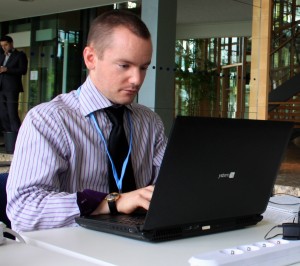
Kyle Gracey was a dual master’s student in The University of Chicago’s Harris School of Public Policy Studies and the Physical Sciences Division, when he was chosen as one of 26 youth leaders to attend the 2009 United Nations Climate Change Negotiations in Copenhagen, Denmark. Little did he know that only 5 months later at the next climate negotiation in Bonn, Germany, he would be interviewing virtually for a Climate and Energy Fellowship at the renowned Worldwatch Institute while there. The Worldwatch Institute is an independent organization that provides policy makers and the public research and analysis that examines the complex links between the global economy and its environmental support systems. Worldwatch Fellows have the opportunity to work on cutting edge policy research while interacting directly with the Institute’s policy experts and decision makers from around the world, particularly in the fields of sustainability, climate change, energy, food policy and agriculture. Before Kyle began his fellowship, he had already accrued an incredible amount of research and leadership experience in international and domestic sustainable development, particularly as a Truman Fellow at the U.S. Department of Transportation and as a Global Observatory Young Expert. We asked Kyle more about his experience on his Worldwatch fellowship.
1. What inspired you to apply for the Worldwatch Institute Fellowship in Climate and Energy?
I had already been working on international climate change & energy issues, and knew about Worldwatch Institute from this work. They’re a very respected organization, so I thought my chances of being able to work on important issues with a high-quality team were good. Since it’s a small staff, there aren’t that many opportunities to work for them, so the opportunity to be a fellow was a great entry point. The climate and energy team had recently begun to develop “roadmaps” for Caribbean island countries to develop their renewable energy potential. Anticipating the boom in hydraulic fracturing, or “fracking”, for natural gas drilling, the team had also just launched a whole program studying the environmental implications of new natural gas extraction. It was an exciting and fortunate time to be joining the Institute.
2. How has the fellowship impacted your career path?
Working at Worldwatch was a great stepping stone. I got to do interesting research on the renewable energy potential of Caribbean islands, plus a lot of grantwriting. The grantwriting experience was helpful for my subsequent non-profit positions, and the research credentials probably helped me earn my current position in Carnegie Mellon University’s Water and Energy Efficiency for the Environment lab. I met professionals working on climate change through this position, and I still interact with many of these people today in my work, so the early connections to them helped us become colleagues faster.
3. What do you think made your application stand out?
I had already met the Climate and Energy Program Director (whom I interviewed with) from my earlier climate change work, so when I applied, I was a familiar face. Plus, I had the education and experience they said they were looking for in the fellowship announcement, and I made sure to highlight those skills in my application. Finally, it probably didn’t hurt that I did my interview by videoconference from inside the United Nations climate change negotiations.
Kyle Gracey will begin his Ph.D. in Engineering and Public Policy at Carnegie Mellon University this fall. In addition to the Worldwatch Institute, his previous jobs include The White House, Climate Action Network International, U.S. Department of Transportation, U.S. Department of the Treasury, and Gade Environmental Group consulting. He serves on the boards of directors for SustainUS: U.S. Youth for Sustainable Development, Student Pugwash USA, and the Truman Scholars Association, and boards of advisors for Green21 and Engineers for a Sustainable World. His awards include the Harry S. Truman Scholarship, BoardSource Emerging Nonprofit Leader, and the American Association for Public Administration Outstanding Graduate Student.
© Victoria Johnson 2013, all rights reserved